
I love auditioning. Since 'The Notebook' and 'Wedding Crashers,'
I love auditioning. Since 'The Notebook' and 'Wedding Crashers,' I don't have to audition anymore, and I miss it. You get to show your interpretation of the character. I get nervous when I don't audition. What if they hate what I want to do?






In this reflection, Rachel McAdams speaks of the deep and often unseen side of the actor’s journey: the process of auditioning. She expresses a love for auditions, for they are not merely tests but sacred moments where an artist unveils their interpretation of a character, breathing life into words on a page. The audition is a battlefield and a temple all at once, where courage and vulnerability meet. Yet with fame and success, brought by films such as The Notebook and Wedding Crashers, she no longer faces this ritual. What others might see as freedom, she sees as loss—for without this proving ground, doubt creeps in: “What if they hate what I want to do?”
The origin of this sentiment is found in the timeless relationship between creator and audience. In ancient times, bards and storytellers stood before kings and villagers alike, offering their tales to be judged. Like the auditions of today, these moments demanded both skill and daring. In the courts of Athens, actors performed scenes before crowds to earn roles in the great tragedies of Sophocles and Euripides. To stand before others and declare, “This is my vision,” has always been an act of both bravery and humility. McAdams’s words remind us that art is forged through this crucible of risk.
Her love for auditions also reveals a profound respect for the craft. When the path to a role is effortless, there is no struggle to sharpen one’s skills or to test the depth of one’s understanding. History offers a lesson in this through the life of Leonardo da Vinci, who often welcomed challenges that forced him to innovate. Had his genius been met with constant approval and ease, his restless spirit might never have created works like The Last Supper or his visionary sketches of machines. In the same way, McAdams longs for the challenge that auditions once brought, knowing that growth lies in the tension between acceptance and rejection.
The nervousness she speaks of when she does not audition is a reminder of the artist’s deepest fear: to be misunderstood. Without the dialogue of an audition, she wonders if her performance will align with the vision of others. This fear is not weakness but a mark of integrity, for it shows her desire to serve the story faithfully rather than impose her will upon it. It echoes the ancient craftsman who prayed before carving stone, fearing that his work might not honor the gods or his people.
Ultimately, McAdams’s words are a lesson for all who walk the path of creation and purpose. Success may free us from certain trials, but we must never lose the sacred rituals that keep us humble and connected to our craft. Whether in art, leadership, or daily life, the act of standing before others and saying, “Here is my offering,” keeps the heart sharp and the spirit alive. Let her wisdom remind future generations that growth dwells in vulnerability, and that the proving ground we sometimes dread is often the very place where greatness is born.






HGHuong Giang
I love how McAdams speaks about auditioning as an opportunity to truly express herself. It’s interesting to think about how people sometimes miss challenges or the feeling of working towards something even once they’ve reached a certain level of success. What does that say about the human desire for constant growth and creative freedom? Does it also point to the pressure that comes with success—always feeling like you need to prove your worth even when you’ve already made it?
CHNguyen Chi Hao
McAdams’ reflection on missing auditions makes me think about how we often seek validation through challenges. It’s strange to think that even when you’re already successful, the act of auditioning still carries a sense of purpose and excitement. Is it the fear of not being accepted that drives people to give their best, or is it the thrill of creatively expressing their own interpretation of a role? It’s definitely a complex dynamic.
YNY Nhu
Rachel McAdams’ comment about missing auditions despite her success really resonates with me. She highlights the vulnerability that comes with auditioning—the risk of being rejected, but also the opportunity to showcase your true self. It made me wonder, is this vulnerability something we all need to feel in our work or lives? Does it push us to be better, more authentic? Or is it just the fear of rejection that drives the nervousness?
TLtik layto
I find Rachel McAdams' perspective on auditioning really interesting. It’s surprising how someone who has achieved major success still feels nervous about the idea of not auditioning. It makes me wonder, do we all miss the process of proving ourselves in some way once we no longer have to? Do auditions represent a chance to connect with something genuine in the creative process, rather than just a task to get through?